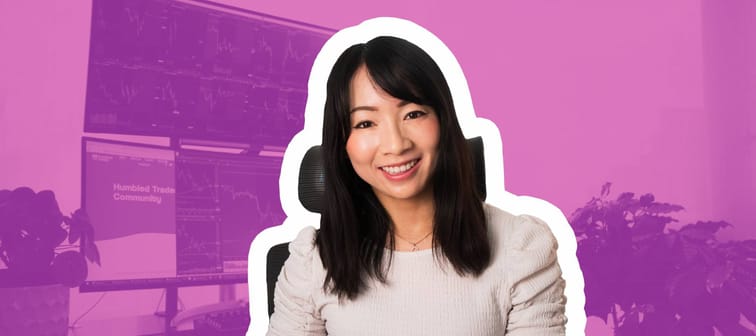1. Prepare for the worst, and hope for the best
In an industry dominated by middle-aged men — according to Zippia, 90% of day traders are male and their average age is 43 — Huang stands out. But she’s worked hard to make a name for herself.
If she had pass on just one lesson from her near decade of experience, she’d encourage new traders to be financially stable before they start trading.
And even if you have plenty of money to spare, she cautions against throwing all your savings into your investing account. Make sure you’ve got a substantial emergency fund set aside in case things go south.
Be sure to manage your expectations too. While Glassdoor says that the average salary for a day trader in the U.S. is $107,800 (which breaks down to $78,109 base salary and $29,691 in additional commissions), there’s a lot of sweat equity involved in making that income.
“I would say the 90% [who] fail are usually the people who couldn't get through the first year,” Huang says.”It's true that only 10% of traders are profitable,” says Huang. “And I would say only about 3% are actually making big money … but I will say most people … have the wrong expectations.”
The next thing you’ll need is a plan. Generally, successful day traders start their workday by strategizing. While the factors that influence your plan may change from day to day, the overall plan should always stay the same — whether you plan to trade $5 or $5,000. It should include:
- Your motivation for trading
- How much time you can commit to it
- Your goals
- Available capital
- Your entry and exit levels (when will you buy a stock and when will you sell it?)
- Your risk management rules
- How you’ll keep records
More: Compare the best investment apps
The importance of research
Research is a crucial aspect in day trading.
Traders usually spend a few hours every day before the market opens looking at the news, assessing trends that may influence the market and reading up on particular companies that have piqued their interest. Then, when the market opens, they just need to follow the plan they’ve made.
In the spring of 2022, Bloomberg noted that amateur day traders — mom and pop investors — who’d flocked to the industry during the first year of the pandemic lost more than a billion dollars during the bull market.
Much of those losses, which Bloomberg attributed to trading costs, super-wide bid spreads — the price difference between what the buyer is willing to spend and how much the seller is willing to sell for — and impetuous buy-ins, were acknowledged as obvious newbie mistakes.
This only drives home the importance of a well-thought out risk management strategy and a finely tuned plan.
Meet Your Retirement Goals Effortlessly
The road to retirement may seem long, but with WiserAdvisor, you can find a trusted partner to guide you every step of the way
WiserAdvisor matches you with vetted financial advisors that offer personalized advice to help you to make the right choices, invest wisely, and secure the retirement you've always dreamed of. Start planning early, and get your retirement mapped out today.
Get Started2. Be ready to learn the hard way
While you’re still figuring things out, you should plan to test that plan with smaller amounts of money until you get a feel for it. Once you’re successful with smaller amounts, you can gradually ramp up if you choose.
“Even if you have $20,000, don't trade with $20,000. If you only have $3,000, risk $10 to $20 just to learn,” says Huang.
She calls this “paying market tuition.” Think of it like the money you pay to attend post-secondary school in order to get a degree.
You will face losses when you’re just starting out, says Huang. But as long as you’re applying those lessons to your trading plan for future trades, you’ll improve.
As for your hours, you can spend as little, or as much time on trading as you’d like on it. Many amateur traders concentrate their trades during “power hours” between 9:30 and 10:30 a.m. and 3:00 to 4:00 p.m. EST.
But as with any practice or profession, the more time you dedicate to learning, the better you’ll become.
However, keep in mind that if you day trade, you’ll never really have time “off.” You may ask a broker to look after your portfolio for a few days and observe your stop-loss orders — an order used by traders to limit losses or lock in a profit — but if you choose trading as a career, be mindful that it will need fairly constant attention.
More: Build your investing portfolio with Acorns
3. Take it seriously, but not personally
It takes a certain kind of personality to thrive as a day trader. Are you level-headed during stressful times? Do you have a handle on your fear and greed, so that you can make rational trading decisions? Do you have a consistent daily routine? Can you stick to a training plan?
Consistency is crucial.
As Huang points out, the market is different every day, so “the way we research stocks, the time [we] wake, the time we get to a computer, every day, it's … the same, it’s set in stone … you want the only variable to be what the market gives you.”
If a stock has an unexpected bounce or sell-off, and you either missed out on the profit or got stung by the loss, try not to take it personally. There are a lot of factors that influence the movement of the market, and as Huang says, “the market doesn't care … the market only cares about taking your money.”
Record your day, amend your trading plan if necessary, brush it off and keep moving forward.
Sponsored
Follow These Steps if you Want to Retire Early
Secure your financial future with a tailored plan to maximize investments, navigate taxes, and retire comfortably.
Zoe Financial is an online platform that can match you with a network of vetted fiduciary advisors who are evaluated based on their credentials, education, experience, and pricing. The best part? - there is no fee to find an advisor.






